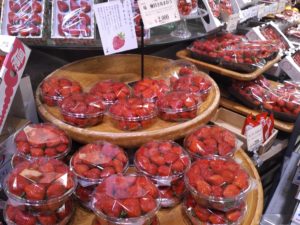Another note on the Japanese food scene
While I was in Japan last week, a colleague from Washington State asked if his local apples were on sale in Japanese supermarkets. I looked. They were not.
If Washington State apples, organic or not, are exported to Japan, they are invisible in supermarkets.
They certainly are invisible to me. Japanese food labels are in Japanese, as is information about country of origin.
But I asked. The apples I saw were grown in Japan.
The only imported fruit I could find were bananas—not labeled as to origin but Japan does not grow them—and blueberries from Mexico.
Imported fruit, it seems, is not available for local consumption because it would compete with fruit produced by local farmers.
Less expensive fruit is imported but used for food service; it is not easily available for home purchase.
This helps explain why the Japanese do not eat much fruit. It is expensive even in local stores. The prices I saw looked like those in Manhattan.
And this brings me to the uniquely Japanese use of fruit as a luxury gift item. These melons (not my photo) cost more than $100 each (the exchange rate is about ¥100 to a dollar). But saw melons like these in specialty stores costing much more—$150 and up.

As for strawberries, these gift packs cost $20 each but more elegant packages go much higher.

These are part of a complicated culture of obligatory gifts. To Westerners like me, the prices are shocking.
The fruit is locally grown, at least.

